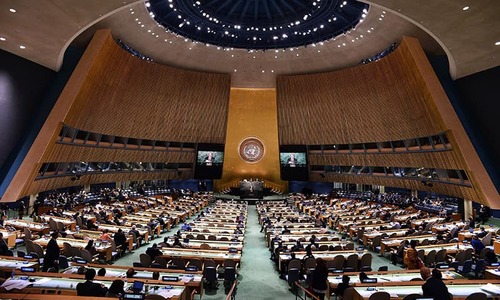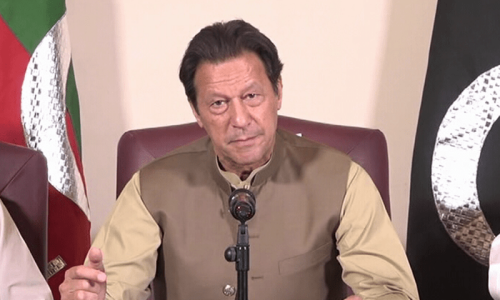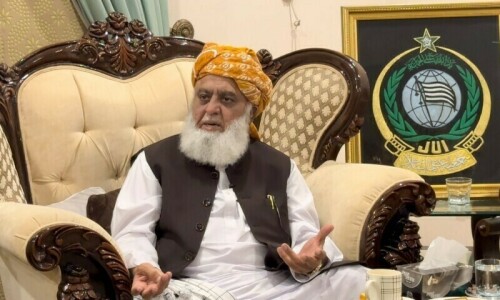EVERY year on Feb 5, the Pakistani nation reaffirms its solidarity with the people of Jammu and Kashmir. The politicians address gatherings. Kashmiris make a chain of human hands on Kohala bridge. Think tanks hold seminars. Like a ritual, we have commemorated this day every year since 1990, when an indigenous wave of resistance surged against the Indian occupation of Kashmir. Pakistanis have surely been steadfast in extending their support to the Kashmiris. And why not? The people of Pakistan and the people of Jammu and Kashmir share centuries-old ethnic, linguistic and religious bonds. So, the solidarity message to the Kashmiris from Pakistanis for the past 33 years is loud and clear: Pakistan stands with Kashmiris.
Beyond the messaging, however, we also need to look into the impact that this message of solidarity has created on India and the international community.
What is crystal clear to the Indian leadership is that Pakistan is not leaving Kashmiris in the lurch, and that if India wishes to see peaceful and friendly relations with Pakistan, it must resolve the Kashmir dispute in accordance with the UN resolutions and the wishes of the Kashmiri people. Is the messaging enough for India to change its approach towards the Kashmir dispute? Probably not. India seems to have chosen the path of finding a military solution to the Kashmir problem. This would be a fatal mistake. The US made a judgement error in continuing to fight for a military victory in Afghanistan, but learned after immense loss of life and treasure, that political solutions are far more superior and cost-effective.
Read: Why Kashmir matters
The Aug 5 Kashmir debacle could prove costly for India.
Will India learn from the Afghanistan experience and try to go for a peaceful resolution of the Kashmir dispute? Again, not likely. The Modi regime is neither listening to the voices of Kashmiris, nor to voices from within India. Many of the sane voices have called upon India to shun the path of military oppression against the people of Kashmir, roll back the assault on their identity (Kashmiriat), and engage with Pakistan for a peaceful resolution of the dispute.
As for the international community, it is encouraging that serious concerns have been raised by the UN and legislators from the US, the UK, and other countries on the heavy-handed approach being pursued by the Modi regime in occupied Kashmir. The UN has published damning reports on gross human rights violations in Indian-occupied Kashmir.
In August 2019, India revoked Article 370 and Article 35A of the Indian constitution ending Kashmir’s special status and dividing it into two union territories. It is not clear why India chose to assault the very identity of Kashmiris and also engage in demographic engineering when it knew that this would evoke an across-the-board resistance by the Kashmiris. It is also not clear how the Modi government would extricate itself from this messy situation that it brought upon itself. Many questions, but few answers.
Meanwhile, the security and humanitarian situation in occupied Kashmir remains grim. With nearly 900,000 troops stationed in the Valley, prolonged curfews, a blackout of communications, and in the midst of Covid-19, the ‘paradise on earth’ has become a living hell for most Kashmiris.
The Modi government did try to entice some pro-India Kashmiri leaders, the so-called Gupkar alliance, to accept the new situation. The initiative could not result in a solution because there was not a single Kashmiri of any political shade that was ready to accept such a blatant assault on the very identity of Kashmir.
The Pakistani leadership has made it clear that there will be no dialogue with the Indian government until autonomy is returned, and then steps are taken to resolve the Kashmir dispute. Some informal contacts between the two sides have been reported, which can provide a basis for forward movement provided the Indian government rescinds its Aug 5, 2019, decisions. If it does not, the Aug 5 debacle alone could become an albatross around the neck of the Modi government.
If India does not go for a peaceful resolution of the issue, it could opt for creating a distraction as has happened in the past, like conducting false-flag operations to depict the Kashmiri resistance as ‘Pakistan-sponsored terrorism’. This would be a high risk move by Indian strategists because this could plunge the region into a kinetic confrontation. Geopolitical dynamics arising out of the US tilt towards India are also complicating matters, emboldening the Modi regime to pursue hegemonic ambitions in South Asia.
With such an uncertain future facing the Indian polity, will the Modi regime muster the courage to right the wrong it has committed? Only time will tell. However, one fact remains unchanged. Pakistan firmly stands with Kashmiris.
The writer is a former foreign secretary and author of Diplomatic Footprints.
Published in Dawn, February 5th, 2022















































